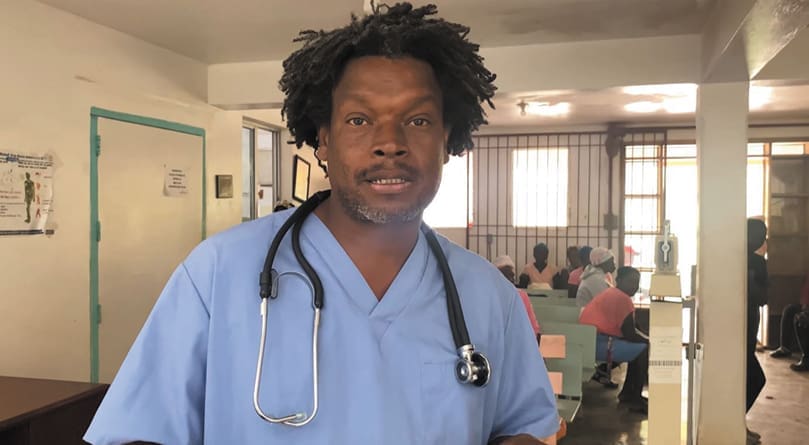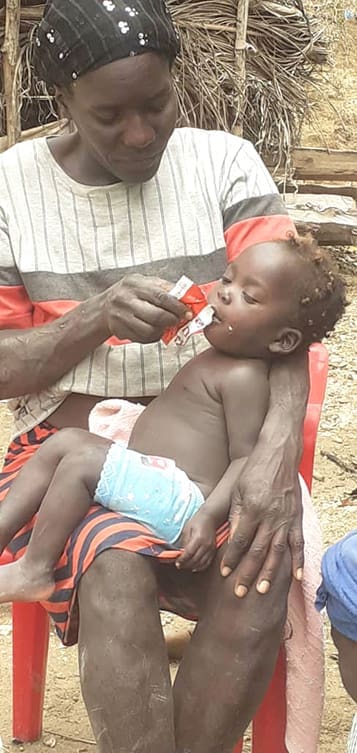 Photo Courtesy ServeHaiti
Photo Courtesy ServeHaiti Atlanta
Through Health is Hope, ServeHAITI brings needed medical, nutrition supplies to families
By NICHOLE GOLDEN, Editor | Published June 13, 2024
ATLANTA—In a video call from Grand Bois, Haiti, a weary Dr. Leopold Bourgouin cheerfully gives a mini tour of the St Vincent de Paul Health Center, operated by the nonprofit ServeHAITI.
“Dr. Leo,” as he is known, is medical director of the rural clinic, located some 40 miles east of Haiti’s capital Port-au-Prince, plagued by gang violence and unrest.
The doctor once thought of being an accountant, but his father intervened. “I was flexible,” he said smiling. “It’s a long journey.”
Dr. Leo studied medicine in Montreal and Boston. He had a practice before signing up to serve Grand Bois as its primary physician in 2001. He started by seeing patients once a month in a makeshift clinic behind St. Pierre Catholic Church that volunteers from the U.S. and Canada had established.
Through the assistance of volunteers and the support of the St. Vincent de Paul Society of Sacred Heart Church in Atlanta, and other donors, ServeHAITI built the health center in 2005.
Dr. Leo has lived just a few feet away from the facility since it opened, tending a garden there. He is one of two clinic physicians providing the only healthcare in the region. Six nurses are on staff, working on rotation for 24-hour care during the week, treating only emergency cases on the weekends.
After contemplating pediatric medicine, Dr. Leo changed the focus of his studies to preventative and social medicine. He earned a master’s degree in water and sanitation.
The clinic typically treats 16,000 people annually, providing primary and acute medical care, dental and malnutrition services, perinatal and obstetrics and pharmaceuticals. The doctor admits that the work is never easy, and with many people fleeing Haiti’s capital, it “puts more pressure on our stock.”
“It’s very difficult for us now,” he said of the impact on the staff. “The fact that we are together in that situation gives us the energy.”

A Haitian mother feeds her child a peanut butter mixture to combat malnutrition. ServeHAITI’s Medika Mamba program provides the mixture of oil, peanut butter and minerals to help babies and children survive and grow. Photo Courtesy of ServeHAITI
Several workers are separated from their families due to the violence and unrest in Haiti, which follows years of political instability and natural disasters.
“Some people can’t even go home,” said Ron Apollon, organizational director for ServeHAITI. A native of Haiti, Apollon lives in Atlanta. He joined the call to talk about supply shortages and logistics for getting needed items to the clinic.
A member of Our Lady of Lourdes Church, Apollon checks in with the Haiti staff daily. He and Dr. Leo say that the most needed items include vitamins, blood pressure medicines and those used to treat common gastrointestinal problems. Infant care supplies are also in demand.
Apollon said many items are in storage ready to be sent, but rising shipping costs are impacting the ability to send them to Haiti. Plans for a new shipping route are in place to prevent the goods from being intercepted by gangs. Donors can contribute to the organization’s “Health is Hope” campaign to help.
The Catholic Church has always been an important partner of ServeHAITI with priests, nuns and volunteers from twinning parishes helping. But safe travel is not currently possible for volunteers from the U.S.
“We keep a good relationship with the church,” said Dr. Leo. “We are a people of God.”
He said the Catholic Church’s involvement in ServeHAITI has been vital to its operation. “They gave a lot,” said Dr. Leo.
Photos of Pope Francis and the Archbishop of Port-au-Prince hang on the clinic’s office wall behind the doctor. Dr. Leo said that the church in Haiti is now in trouble too.
St. Thomas More Church parishioner Gregory Amoroso is ServeHAITI’s treasurer. Amoroso has traveled to Grand Bois several times since 2012 and enjoys helping the Haitian people.
It’s a farming environment where families don’t have running water and use charcoal fires for cooking in their homes, he said. It’s not unusual, said Amoroso, to see 6- or 7-year-old children hauling buckets of water for their families.
ServeHAITI has drilled five community wells and has distributed more than 5,400 water filtration systems. Families learn proper use of the systems as health is linked to clean water. The organization works to combat malnutrition with its Medika Mamba (peanut medicine) program. The mixture of peanut butter, powdered milk and vegetable oil with vitamins and minerals helps infants and children to survive and grow. The clinic’s staff also conduct home visits to check on their neighbors.
Amoroso said the organization recently received a grant from Kellogg’s to help struggling mothers.
Even given past hardships, Amoroso is noticing that many in the community are expressing stress for the first time.
“It seems like this could be the breaking point,” he said of the current atmosphere.